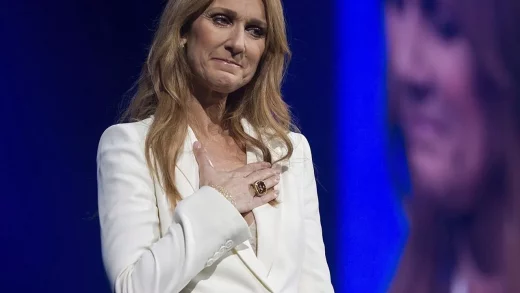:format(webp)/https://www.thestar.com/content/dam/thestar/entertainment/music/2023/02/21/def-jams-new-exec-kardinal-offishall-to-canadian-celebs-show-your-support-at-home/20230217120236-43fdf13ad50d9d7dec27165f98daa6b213eb517d83331fe5a1b258a649153f29.jpg)
TORONTO – Kardinal Offishall has a message for his fellow Canadian celebrities: you’ve got to step it up at home.
This is coming from a Toronto hip-hop star who has been a seemingly inescapable presence in the domestic arts and entertainment scene for decades.
At the 2021 Juno Awards, he took viewers on a comprehensive journey through Canada’s rap music history and more recently voiced introductions for a program of influential 1990s Black American cinema earlier this year at Toronto’s TIFF Bell Lightbox.
He’s also appeared as himself on an episode of the CBC sitcom “Run the Burbs” and next month he’ll slide into one of the judges’ chairs on the new season of Citytv’s “Canada’s Got Talent.”
When asked why he’s chosen to make his personality a central part of the local cultural scene, he raises a different question. Why aren’t other famous Canadians doing the same?
“I don’t want to call out anyone,” he prefaced in a recent interview at the headquarters of GhostLabel, a Toronto fashion brand he often wears at appearances.
“But some of the biggest artists that we have — how incredible would it be if they actually showed up?”
Major events in other world-class cities seem to have no trouble drawing star power. He points out New York Fashion Week as one example. Why shouldn’t Canadian cities see the same support for their creators?
The potential is certainly there. Arguably, there are more famous Canadians in the entertainment world than ever – the Weeknd, Justin Bieber, Ryan Gosling, Shawn Mendes and Avril Lavigne to name just a few.
And while Drake is often courtside for the Toronto Raptors and Ryan Reynolds is waving the flag in his own ways, most of the biggest Canadian celebrities live outside the country and rarely turn up at homegrown events unless they’re being honoured by an institution.
Kardi – as his fans affectionately call him – is different in that sense.
Rising to fame in the early aughts, he helped construct a sturdy, mainstream Canadian hip-hop empire with his friends years before Drake was even thinking about the blueprints for his Toronto mansion.
The rapper’s 2008 dance floor filler “Dangerous” with Akon made him the first Canadian rapper to crack the Billboard Top 100 charts, where it topped out at No. 5.
Search Kardinal Offishall on Google and you’ll find his frequent presence on red carpets for Toronto Fashion Week, local charity fundraisers and Canadian music gatherings. He’s known to MC events he believes in and proudly notes he was a vocal supporter of the fledgling Toronto Raptors long before the bandwagon rolled into town.
All of this activity earned him the unofficial title of “Canada’s Hip-Hop Ambassador,” a name that causes him to retch at its mention.
“Sorry, I threw up in my mouth a little bit,” he jokes.
OK then, how about “Canada’s Arts Ambassador”?
“Hmm, not really, but I get it. Thank you.”
The longer you talk to the 46-year-old performer, born Jason Harrow, the more apparent it is that he dislikes most titles given to him. Except there’s one he’s particularly proud of lately.
Earlier this year, it was announced he joined the executive ranks at Def Jam Recordings, the legendary hip-hop label co-founded by Rick Rubin.
As the record label’s first global A&R representative, Harrow is responsible for discovering the next generation of talent and fostering relationships for lasting careers.
It’s a step up from his former gig as senior vice president of A&R at Universal Music Canada where under his tenure the label saw the rise of various newcomers, including Juno-winning R&B singer Savannah Ré, who was championed by Canadians Boi-1da, Jessie Reyez and Wondagurl.
When Def Jam came calling, in a stretch of roughly two years in the job, Harrow decided it was worth the leap.
“Universal Canada is super dope, but if you compare it to sports it would be like going to prep school,” he explains, of moving to the label that is known for elevating the careers of Jay-Z, DMX, Ludacris, Rihanna and Kanye West.
His experience at the Canadian label “really sharpened the blades” for the big leagues, he says. Now he has “more resources and more opportunities” at his disposal to reach the masses.
In his new role, Harrow answers to CEO Tunji Balogun and executive vice president LaTrice Burnette as he scours the globe for untapped talent. The overarching goal is to encourage a “resurgence of the Def Jam culture,” from music to its lifestyle and branding extensions.
He’s already signed at least one act, an R&B singer from Texas named Susan Carol, who previously appeared on his 2021 collaborative track “Freedom Heights” alongside Jully Black and R&B newcomer Emanuel.
Beyond that, he’s scoped out South Africa, the United Kingdom, Ghana and Jamaica to find other Black music, he says. His experience at Def Jam has already proven to be much different than his past executive roles.
“You get on these calls where you don’t have to blackspain yourself to anybody. Everybody gets it,” he says.
“That’s why, for me, it feels like a dream job. Everybody speaks your language, they’re on the same page, and they have the same goals.”
Pairing that personal connection with his knowledge of the music industry, Harrow says he’s confident his Def Jam era will be fruitful, especially at a time when many record labels can’t see beyond TikTok and social media to discover new talent.
“To me, these are all reactive tools, meaning by the time it’s gone viral, you’re reacting to something that’s already happened,” he says.
“I tend to be able to see the magic before a lot of the tools that people use in 2023.”
Somewhere in his flurry of plans, Harrow hopes to release new music. He’s cagey on when that might take shape or if Def Jam will be involved.
His focus, for now, is on the many projects he’s juggling outside of his own hip-hop career. And he’s fine with that, he insists.
“I’ve done all the other stuff … got a bunch of plaques at home, toured the world, done this, done that,” he says, adding that he’s focused on ways to “diversify” his career.
“All the pressure is gone with everything I do and I can just focus on the passion,” he adds.
“Maybe not for everybody, but for me, that is truly success.”
This report by The Canadian Press was first published Feb. 21, 2023.
Note to readers: This is a corrected story. A previous version said Kardinal Offishall signed Savannah Ré. In fact, he was an A&R at Universal Music Canada during her rise to fame but did not sign her.
JOIN THE CONVERSATION


